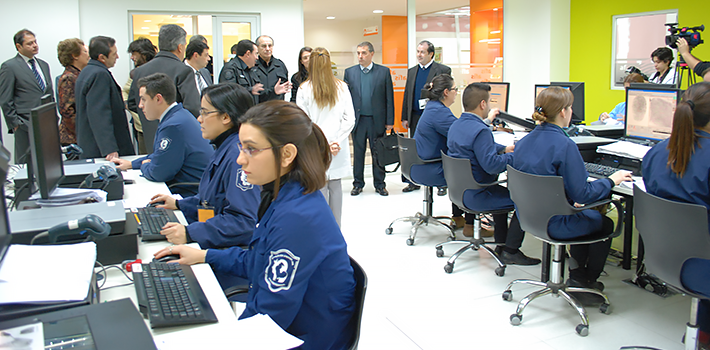
EspañolCuba’s influence in Latin America has not gone unnoticed. Whether through the insurgent movements of the 1970s and 80s under the banner of socialism through armed struggle, or the political rhetoric enshrined in several countries throughout the region, especially since Hugo Chávez’s rise to power in Venezuela in 1998, the island’s influence in the region has always been strong.
Cuban exports, however, are not limited to ideological arguments and military strategies. In recent years, a large number of Cuban doctors have landed in Venezuela and Brazil and are developing government programs in these countries in exchange for oil and US dollars — two critical imports for the Castro regime’s survival. In the 21st century, however, Cuba did not want to be left out of the new economy. Through a network of state-owned companies, it has begun to export the software and technical know-how of the island’s specialty: mass surveillance and social control.
Among those companies, Datys, which operates directly under the Ministry of Interior, enjoys the widest international reach. Argentina, Bolivia, and, of course, Venezuela, hired the company in recent years for the provision of biometric identification services. From the production of identity documents and passports to the installation of specialized equipment to monitor citizens, the Cuban company provides these governments the essential tools to control their populations.
The tendency to adopt biometric identification systems is widespread throughout the region. Furthermore, the role of the Cuban government in the development of these systems raises serious doubts about the reliability in the management of this information. “These companies are part of a strategy to extend the influence of Cuban intelligence networks in the region. They are actually a front for the G2 that allows them to control the systems for the production of identity documents, which in turn allows them to decide who these documents are granted to,” says Anthony Daquin, a former consultant for the Interior Ministry of Venezuela. Daquin, now exiled in the United States, was involved in the incorporation of biometric systems in Venezuela.
Datys reports to the Cuban Ministry of Interior, just like the Cuban Intelligence Directorate, also known as “G2.” The rise of Datys is no coincidence. Ever since the creation of the “Inter-American Program for Universal Civil Registry and the ‘Right to Identity'” in 2008, the Organization of American States has promoted the use of biometric systems in the creation and management of identity documents. Fingerprints, facial features, or the iris of the eye are some of the parameters that allow these systems to verify the identity of people.
The Cuban presence raises further questions about the use of biometrics. With or without Cuban intervention, however, creating databases with these identifiers presents a serious threat to privacy and individual rights.
The threat to privacy is obvious. Biometric systems convert the physical attributes of a person into their identity card and expand opportunities for domestic spying. Therefore, when used in combination with surveillance cameras in public places, authorities can identify individuals who attend a demonstration, track their routines, or analyze their relationships and affiliations. In short, they can easily obtain a snapshot of the daily activities of every citizen.
Constant surveillance means setting aside one of the fundamental guarantees that is explicitly and implicitly found in most constitutions: the presumption of innocence. Security expert Bruce Schneier illustrates this point by quoting Cardinal Richelieu: “If one would give me six lines written by the hand of the most honest man, I would find something in them to have him hanged.” In the same vein, novelist and Soviet dissident Aleksandr Solzhenitsyn once said: “Everyone is guilty of something or has something to conceal. All one has to do is look hard enough to find what it is.”
Centralized databases with biometric information also pose additional challenges in terms of protecting the confidentiality of the data. Secure storage that is impervious to outside attack is a basic condition required for all systems in order to prevent data theft. But it is also necessary to count on institutional mechanisms to guard against the possibility of an abuse of power by public officials in a system that increases the potential for abuse.
In the case of Latin America, the risks are multiplied. With a political tradition whose history is no stranger to coups and strongly authoritarian governments, the danger that biometric identification systems will be used to persecute political dissidents is always lurking.
Although the road to a surveillance society, where privacy becomes a privilege rather than a right, seems inevitable, the British managed to hold back this process. In 2010, they repealed the Identity Cards Act, passed four years before, which would have created a national ID card and biometric database system. Critics of the proposal pointed to the high cost of the system, conflicts with privacy, and the negative bias toward members of ethnic minorities who believed this system would make them vulnerable to abuse and discrimination.
The future on this side of the Atlantic is not so encouraging. Biometric registration has just been implemented in Bolivia in preparation for the upcoming presidential elections, and Brazil is expected to have its 132 million voters registered in a biometric database by 2018. Chile and Argentina are following the same path.
Biometric identification is yet another step down the slippery slope of technological progress and diminishing privacy. Whether its implemented in the name of security, the right to identity, or protection against electoral fraud, all paths lead to the same destination: surveillance and social control by the state apparatus.
 Versión Español
Versión Español












